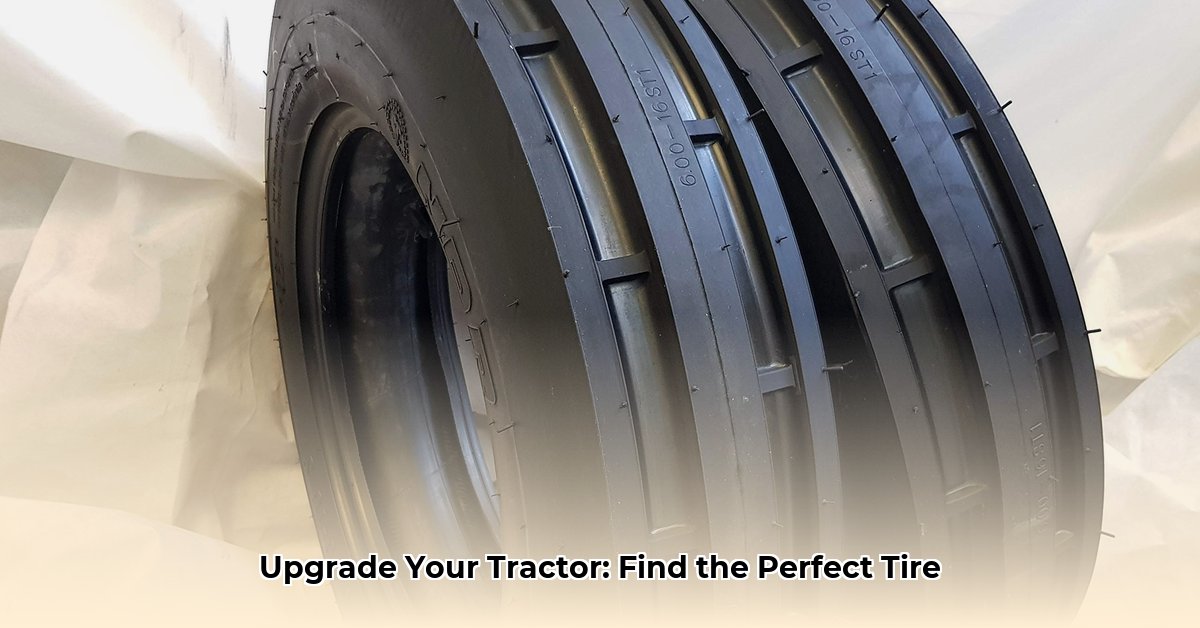
6.00 x 16 Tractor Tires: A Comprehensive Guide
Choosing the right tires for your tractor is crucial for efficiency and longevity. This guide focuses on 6.00 x 16 tractor tires, a common size for smaller tractors and implements. We'll cover key features, compare brands (where data allows), and provide a step-by-step approach to selecting the perfect tire for your needs and budget. We'll also touch upon maintenance and speculate on future trends in this essential piece of farm equipment. For larger tractors, consider exploring options like 18.4-R30 tires.
Decoding Tire Specifications: Load, Ply, and Tread
Before diving into brands, understanding tire specifications is key. Let's break down the common terms:
Load Rating: This indicates the maximum weight a tire can safely carry. A higher load rating means a greater hauling capacity. For example, a tire with a load rating of 1000 kg can carry up to 1000 kilograms. Higher load ratings often mean slightly less fuel efficiency.
Ply Rating: This refers to the number of layers of fabric within the tire. A higher ply rating generally means a stronger, more durable tire, better suited for rough terrain. However, higher ply ratings can result in increased rolling resistance, thus impacting fuel efficiency.
Tread Pattern: Different tread patterns are designed for different applications. Aggressive, deep treads offer superior grip in muddy conditions but may sacrifice some fuel efficiency on paved surfaces. Shorter treads, designed for paved roads, optimize fuel economy but may reduce traction in mud.
Finding precise specifications requires checking manufacturer websites. This is crucial as the information varies between brands and even models within a brand.
Top Tire Brands and Price Ranges: A Preliminary Overview
Several reputable brands produce 6.00 x 16 tractor tires. Unfortunately, comprehensive price comparisons are challenging due to fluctuating prices and promotions across different retailers. While online retailers like Amazon and SimpleTire can give a general idea of price points, always confirm pricing directly with vendors to avoid assumptions. Remember, the lowest initial price isn't always the best indicator of value; consider factors like tire lifespan and fuel efficiency.
A Step-by-Step Buyer's Guide
Choosing the right tire requires a methodical approach:
Step 1: Define Your Needs:
- Primary Tractor Use: Fieldwork, hauling, or road travel?
- Soil Conditions: Primarily hard-packed soil or frequently muddy?
- Budget: How much are you willing to invest in tires?
Step 2: Match Tire Features to Your Needs:
- Fieldwork: Prioritize high load ratings and aggressive tread patterns for maximum grip.
- Hauling: Consider a higher load rating to handle heavier loads.
- Road Travel: Select tires offering good fuel economy and less aggressive tread patterns.
Step 3: Total Cost of Ownership:
Initial cost isn't the only factor. Assess:
- Fuel Efficiency: How will the tire's rolling resistance impact fuel consumption over the tire's lifespan?
- Tire Lifespan: A longer-lasting tire may offset a higher initial investment.
Essential Tire Maintenance
Regular maintenance extends tire life:
Inflation: Maintain correct tire pressure, as specified by the manufacturer (often located on the tire sidewall). Underinflation dramatically decreases fuel efficiency and increases wear.
Inspection: Regularly check tires for cuts, punctures, and unusual wear patterns.
Storage: Store tires properly when not in use, protecting them from sun, moisture and extreme temperatures.
Future Trends in 6.00 x 16 Tractor Tires
The agricultural industry is relentlessly pursuing sustainability and efficiency. Expect future innovations focusing on:
- Improved Rubber Compounds: Enhanced compounds that provide greater durability and resistance to wear and tear.
- Optimized Tread Designs: Innovative tread patterns that improve both traction and fuel efficiency.
- Reduced Rolling Resistance: Designs and materials breakthroughs to minimize energy loss during operation.
Conclusion: Choosing Wisely
Selecting the right 6.00 x 16 tractor tire requires careful consideration of your specific needs and operating conditions. By following this guide, considering long-term costs, and performing regular maintenance, you can ensure your tractor operates efficiently and productively for years to come. Always consult manufacturer specifications for detailed information and seek advice from agricultural experts when needed.